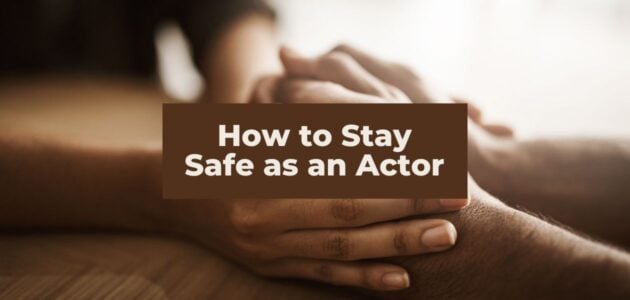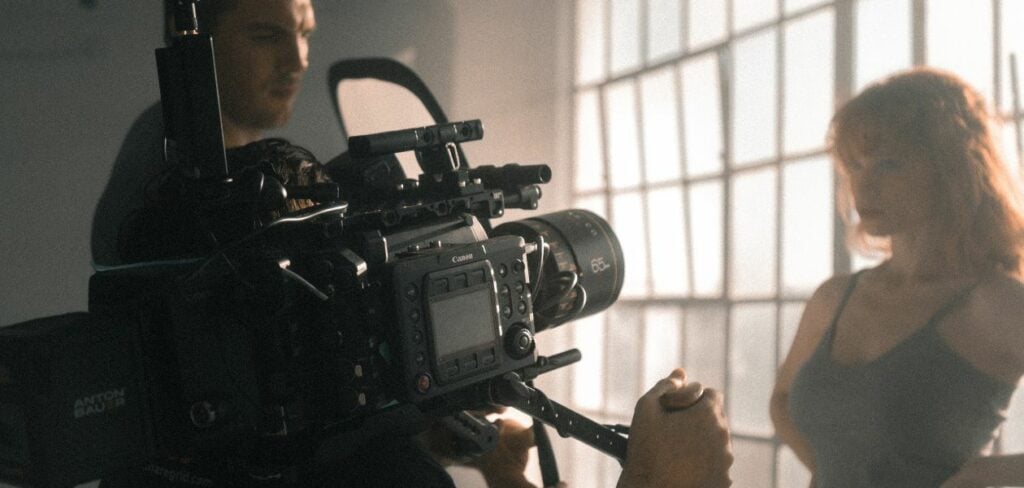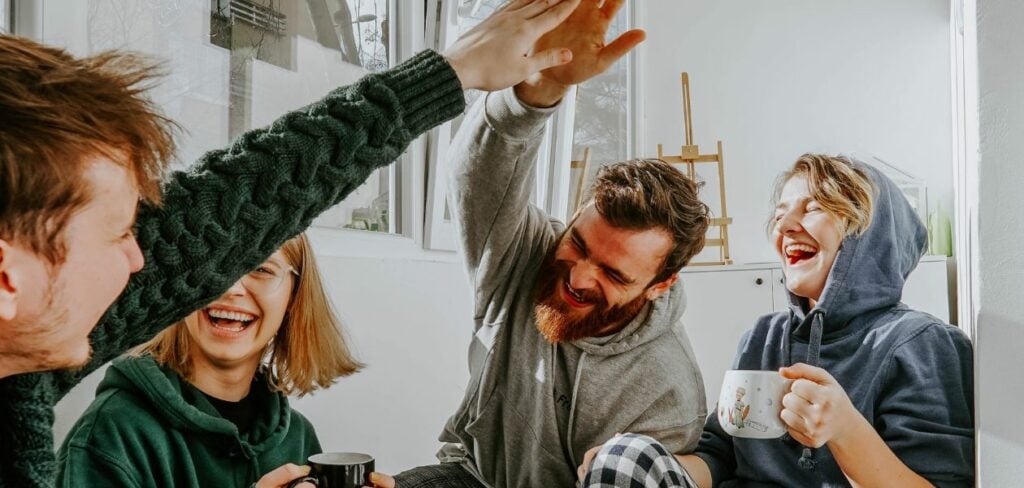
How to Stay Safe as an Actor
Acting can be one of the most rewarding, fulfilling and satisfying careers on a professional and personal level. Not only do you get to play make pretend (let’s be real, that’s acting right?) but you also get the opportunity to meet some incredible people, plus make cool connections and compelling friends along the way. Sounds great, right? You wouldn’t want to cut this ride short for anything! This is why it’s vital to learn how to stay safe as an actor.

Unfortunately, like any industry, it is not all sunshine and roses. In fact, along your acting journey there is a chance that you’re going to meet some toxic personalities who don’t exactly have your best interests at heart. The problem, of course, with these kinds of people, is that they don’t just come out and say: “Hey! I’m a crazy, bad person and I’m going to take advantage of you!”
Most of these undesirable personalities come to you wearing the costume of charisma and friendliness. This can make it extremely difficult to discern who’s a bad apple. Does this mean that anyone who is kind to you and wears a big, toothy grin is out to swindle you? Of course not! I have met some incredible people who have changed my life for the better through this industry, and I have met some who have had less than honourable intentions. I have—along with other actors that I know—been scammed, taken advantage of and been swindled. Unlucky for me, but lucky for you: because now you can learn from my mistakes.
In this article, I’ll outline some hints, tips and tricks to look out for so that you can stay safe and well on this amazing journey we call acting. So take those rose coloured glasses off for a moment while we hunt down some of those red flags.
Agents
Ahh, I can still hear them now. I was young, dumb, and totally okay with this stranger who I just met telling me that they’re gonna make me a star. This was many years ago now, but essentially how one of my first meetings with an agent went. And of course I took them up on their offer and signed a super dodgy contract! Nowadays, the industry is far more regulated; still, with new agencies popping up everyday and most of them here just to make a quick dollarydoo (a legitimate currency in Australia), it can be hard to figure out who has your back and who just wants your money.
#1 Watch out if they try and make you pay a sign up fee!
This is straight up illegal. No “ifs” or “buts” about it. You will, however, need to pay for whatever casting websites that you have to use. It is always reasonable to double check if the website that you are signing up for is legit also. Most will cost you around $200AUD a year. So keep that in mind. Other than that, there are no other costs an agent should be charging you (except their 10-20% commission).
#2 If it sounds too good to be true, it probably is.
Be careful of any agent, or anyone really, making outlandish promises. If they are certain that they can make you a star, famous, or guarantee you work, then that’s a massive red flag. A good agent doesn’t make promises except for maybe trying their hardest to get your foot in the door for auditions. And while a good agent can take you far, no one person can make you successful.
#3 Try and avoid lock-in contracts.
A good agent doesn’t try and lock you down. There are exceptions to this, but if you’re new to the game most agents that you will be looking for aren’t going to be WME: they’re going to be most probably local agencies. If one of the big ones offers you a year-long, lock-in contract, that is a good deal! If some random local agency you’ve never heard of before offers you a year long lock-in contract, that’s different. You don’t want to be signing up to an agent who you later discover is no good, only to be stuck with them for a year. Not ideal.

#4 They try to restrict your freedom.
This point isn’t as talked about, because I believe it might not always be as obvious as the others. A classic scam is when an “agent” will sign you up and then make you pay for specific services. For example, I was with an “agent” who forced me to pay for headshots from a specific person (ended up being their cousin (shocking)) and insisted I pay for classes that they ran. If we didn’t? We would “mysteriously” not get put forward for work. Other dodgy agents may put clauses in your contract that allows them to micromanage your career and restrict your work. Always remember to read any contract before signing. A good agent will give you recommendations in regards to where to get headshots and good acting lessons, not force you to do them. If they really didn’t believe in your acting abilities, they wouldn’t have signed you.
#5 If you can, ask others for a reference.
Funnily enough, most reputable agencies will do the same about you when you’re looking to join. A simple reference check can go a long way and save you much hassle and money in the long term. Before you sign up to any agency, ask around and do your research. Look up who they represent; if you know some of their talent, reach out and ask them about their experience. If you’re not comfortable with that, join up with some local acting Facebook pages and ask on there. If someone has had a legitimate bad experience with an agent, it won’t be too hard to find if you ask around, and visa versa.
If you’re on the hunt for a reputable agent, check out ‘How to Contact Acting Agents’
Casting Directors
They’re the people who everyone wants to impress and win over. They have the responsibility of who gets the job and who doesn’t. But with great power must also come great responsibility. A good casting agent will never abuse that power. Ever. Here are some tips to use and reflags to look out for:
#1 False Promises
Similar to agents, a good casting director will never give you any outlandish promises. In fact doing any such thing would be unprofessional. This is what casting directors are looking for. If ANY casting director, or any one in the industry ever requests something from you that would make you uncomfortable, then you have the right to say no.
#2 A Paid Audition
This is ALWAYS a scam. I remember not too long ago where there was a “casting director” was pretending to be an employee for a well known streaming service, and was making the participants pay to audition for the “next big thing.” Of course there was no next big thing, or anything really. Just a person who could be best described as a word beginning with A and ending with hole, trying to make a quick dollar.

#3 They are a Mystery
This principle ,once again, is quite similar to the red flags in regards to agents (are you seeing the pattern yet?). If, say, for example, a “casting agent” sends you a message on your Instagram and asks you to come to their “super professional warehouse” where they want you to audition for a mystery project … it’s safe to say they are probably not legit. Especially if they have no website, and their Insta has 10 followers. It sounds obvious, but you’d be surprised. It’s not that actors are necessarily gullible, but more that these scammers have over time gotten better at preying on starry-eyed folks with big dreams in mind.
- Sydney Casting Directors
- Brisbane Casting Directors
- LA Casting Directors
- London Casting Directors
- Melbourne Casting Directors
- Toronto Casting Directors
On-set Safety
So far, everything has been, for the most part, common sense. Using everyday wisdom when it comes to sussing out bad agents and fake casting directors will help you avoid a catastrophe almost every time. Now I want to give you some insight into something that is, I believe, not talked about as often as it should in the acting world: safety and consent on set.
Story time:
Many years ago when my best friend and I were but young, naive actors, we got to be a part in a snazzy student film. Now, if you’re just starting out, student films are great. Usually they’re using the university’s cameras so the quality of your footage is crisp, it’s a good way to network and make friends, and get a feel for what it is like to be on a set. However, like most things there is always a downside to be wary of. Student films are, by definition, made by amateurs. Which is fine of course. You have to be an amateur before you become a pro, but naturally that comes with a whole bag of problems which can be boiled down to blatant unprofessionalism. This can be dangerous, as it was in my friends cas’e.
My friend (we’ll call her “Daniella”) was the main character, so there was a lot riding on her shoulders. During the climatic scene she had to crawl through “glass” so naturally they started off with sugar glass, which is a soft, fake substance. Very ideal, and very safe. However the director (we’ll call him Mr. Poo Head), didn’t like the look of the fake glass on camera and decided to break real glass on set for Daniella to crawl through. Obviously, Daniella protested. This was highly unsafe, and asking her to put herself through an unnecessary and dangerous task is nothing short of abuse. But Mr. Poo Head decided that he was going to get his way, so he argued, pleaded and guilted Daniella to do the stunt to the point where she reluctantly gave in. Luckily she managed, somehow, to not cut or injure herself.
Unfortunately, this not an isolated incident. Ask any actor. They have either seen, heard or experienced something like this or some version of this type of cohesion. Some may argue that Daniella could have just left instead of crawling through the glass. Which, yes, is technically true. But it’s a closed-minded argument that ignores the actual problem at hand. No-one should be forcing anyone on set (or anywhere) to do something that makes them feel unsafe or uncomfortable. Social expectations and peer pressure play a heavy role, and people like Mr. Poo Head know this and will use it to enact and justify predatory behaviour.
So, I am here to tell you, my fellow actor: that you can say no. No is a complete sentence, and you are in fact allowed to leave any set that makes you feel unsafe, or uncomfortable, or threatened. At the end of the day it’s just not worth it. You don’t owe anyone anything. Communicate your boundaries and give yourself permission to walk away if your health or wellbeing is in danger.

Here are some tips and things to look out for:
#1 Always try to let people know where you are.
You’re not always going be shooting at a studio or populated location. Sometimes, you’re going to be shooting in the middle of nowhere or out of town. A majority of the time this will be fine, but it’s best to always let people know where you are. When you’re first starting out, especially, you’re not going to know most of, or even all of the people you are filming with. So if the first time meeting everyone is on set in the middle of nowhere, it’s best to alert people where you are going. I know it sounds pedantic but the old “better safe than sorry” is still sound advice.
#2 Bring someone along with you.
You don’t have attend auditions, set, and shoots alone. It is more than okay to bring a friend. Having someone know where you are, and having someone with you to give a second opinion and keep you grounded, is a great strategy for staying safe. It can be wise that you bring along an actor friend who has more experience than you and therefore can give you great advice on the day. But having anyone there that cares about you can be a great help to your safety and well being.
#3 Put your boundaries in writing.
Have a meeting before filming in regards to your hard limits. This is especially important if there are any intimate, romance, or nude scenes in the project. If a director springs on you that today you have to do a kiss scene (for example), and there has been no prior agreement beforehand, turn the idea down. Remember that you don’t owe them anything; it is not your responsibility to keep track of these things. Any good director will be happy to discuss your boundaries and limits with you and adhere to them through out shooting. If any director has a problem with either of these things, it is a huge red flag and I would recommend declining the project.
#4 The ultimate rule: follow your gut.
If it feels off, if you’re not vibing with the person, production or circumstance, just politely decline. The times when I’ve gone wrong in life—both personally and professionally—is when I have ignored my gut instinct. It can be hard, too. Sometimes everything seems fine, and at face value there isn’t anything to worry about. Still, listen to your gut. Usually your intuition is your subconscious identifying a red flag and trying to warn you. And hey, it won’t always be correct. But often it’s best to prepare for the worst and be pleasantly surprised, than the other way round.
That’s a Wrap
I dearly hope, my fellow actors, that you never end up in any of these situations and you have a long, happy, safe acting career. Unfortunately not everyone you meet is going to have your best interests at heart. So stay safe out there! You might not always feel it, but it is you that has the power in these situations. You have the power to set your boundaries, be firm and say no.

And please don’t let these stories and warnings deflect you from actually getting out there and acting. A majority of the people you meet will be interesting, creative and kind individuals. Instances like these are, overall, quite rare, and in this current climate things have gotten better. (It can keep getting better too by keeping dialogues and discussions like this going.) So make sure you always check in with your fellow actors and artists and make sure you have each other’s backs. Don’t let anyone deter you from chasing this crazy dream and doing good work.
Stay safe, and as always, stay hungry.

Leave a Reply